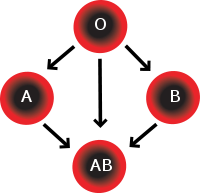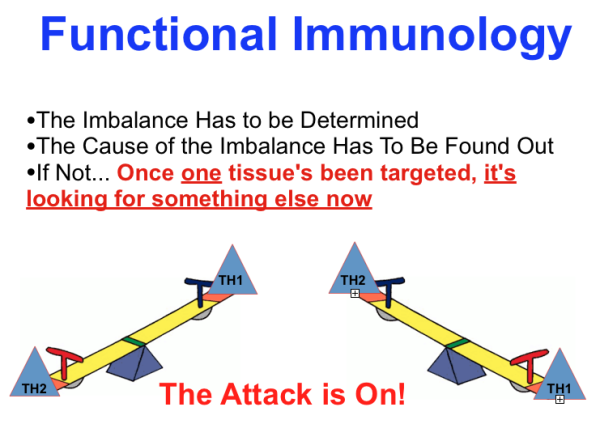In order to maximize your health and reduce your chances of developing autoimmune diseases such as Hashimoto's, Celiac disease, rheumatoid arthritis, diabetes and other illnesses, it pays to know your blood type. Let's explore this concept in more detail.
From the Desk of Dr. Karl R.O.S. Johnson, DC.....
Your Blood Type and AutoImmune Disease, Inflammation and Fatigue
Posted by Dr. Karl R.O.S. Johnson, DC on Sun, Oct 09, 2011
Topics: autoimmune, Hashimoto's, inflammation, Blood Type, Diabetes, fatigue, Dr. Karl R.O.S. Johnson, Lectins
Allergies and Autoimmune Disease - An Immune System Imbalance
Posted by Dr. Karl R.O.S. Johnson, DC on Tue, Sep 06, 2011
Thanks to Dr. Robert E. Zee, B.S., Eng., D.C. for the following blog post, which I repost here with his permission. I find it explains the concept of why the immune system gets out of balance. As you might expect, I recommend you always attempt to get to the bottom of a health challenge, rather that treating just the symptoms or outward signs. That is what constitutes true heatlth care.
Topics: autoimmune, TH1, TH2, allergies allergy, immune
Say Goodbye to ADD/ADHD with Neuro Metabolic Therapy
Posted by Dr. Karl R.O.S. Johnson, DC on Tue, Aug 30, 2011
The human brain is a complex organ, capable of incredible feats of brilliance and fueling subconscious fears and desires. Until recently, many in the medical profession ignored the role our brains play in our overall physical health. Instead, doctors treated the symptoms — pain, insomnia, intestinal distress, ADD — while ignoring the role our brains play in causing these symptoms, particularly for chronic conditions. A new generation of physicians, however, takes a new approach to treating chronic conditions working with patients to heal through the brain. These treatments, often referred to as brain-based therapy or Neuro Metabolic Therapy promise especially exciting breakthroughs for patients with chronic conditions, particularly those with ADD and ADHD.
The Basics
Brain Based Therapy and Neuro Metabolic Therapy recognize that the brain controls all the functions of our bodies. Without proper brain function, the body falters. When the brain works efficiently and functions normally, we have healthy bodies. External influences like allergies and stress or internal influences like emotions or energy imbalances can interfere with the brain's ability to function properly. When our brains run inefficiently, it can lead to chronic conditions like ADD and ADHD.
The medical profession has identified possible physiological causes of ADD and ADHD. They include chemical imbalances in the brain and the underdevelopment of the areas of the brain that control attention. But these "reasons" don't get to the why a chemical imbalance might occur. Brain Based Therapy, on the other hand, seeks to get to the root cause — the why — of the chronic condition.
How it Works
Brain Based Therapy, Johnson Neuro Metabolic Therapy and similar methods of treatment use a variety of approaches to figure out why a chronic condition is occurring. The therapy most often starts out with a comprehensive brain and nervous system exam. Physicians specializing in more holistic approaches to treating ADD and ADHD will also explore possible allergic causes or nutrient deficiencies through extensive testing. Foods like gluten, yeast, soy and casein can cause a person's immune system to attack the body (autoimmune) and cause a host of symptoms including pain, neurological problems and intestinal distress. These allergies and food sensitivities then often cause nutritional deficiencies that can be treated with specific nutritional supplements and dietary changes.
These holistic therapies also work with patients' bodies. People with ADD and ADHD respond particularly well to treatments involving specific rhythmic exercises (Interactive Metronome). Doctors may also incorporate energy work to reestablish a body's natural energy balance. Acupuncture works on this principal and has been incorporated into standard Western medical practices.
The Treatments
Practitioners of Brain Based Therapy and Neuro Metabolic Therapy work from a whole body perspective. These are not the only treatments, however. Similar treatments that physicians using Brain Based Therapy might also include Interactive Metronome approach. This approach to ADD and ADHD challenges patients to match a range foot and hand movements to a precise computer generated tone. This treatment teaches patients how to focus for longer periods of time, filter out internal distractions, and monitor both physical and mental actions at the same time.
Another therapy often incorporated into Brain Based Therapy by Dr. Karl Johnson, DC of Shelby Township, Michigan is Nambudripad's Allergy Eliminations Techniques or NAET. These techniques expose patients to energetic analogs of allergens or stressors and focus on improving the body's energy balance. It is believe that hidden allergies can block energy pathways leading to conditions like ADD and ADHD.
Heal Thyself
The human brain is a truly magnificent wonder. It can make us sick and it can heal us. Taking a comprehensive, whole body, brain based approach to treating chronic illness is a proven pathway to treating chronic illnesses, particularly ADD and ADHD. Rather than spending your life on Ritalin, which only addresses the symptoms of this chronic condition, get to the why of this neurological approach. Brain Based Therapy using Johnson Neuro Metabolic Therapy has restored the proper functioning of the brain is many patients and returned their body to an optimal state of health.
Topics: Dr Karl Johnson, autoimmune, ADD, ADHD, Johnson Neuro-Metabolic Therapy, brain based therapy, Interactive Metronome
Why A Gluten Free Diet May Not Be Enough to Stop Inflammation
Posted by Dr. Karl R.O.S. Johnson, DC on Tue, Aug 16, 2011
Adopting a gluten free diet has helped many people begin a healing process that will take years. Thanks in part to a recent surge in gluten sensitivity diagnoses and improved gluten free products, more and more people are starting down the path that will help them find relief for the chronic pain, inflammation, fatigue and intestinal distress they have suffered with for many years. However, a gluten free diet alone may not be enough to stop inflammation from occurring. People who have started a gluten free diet but who still experience inflammation and other symptoms should consider additional testing and dietary and lifestyle changes to address ongoing, chronic symptoms.
Why Do I Still Feel Bad?
Adopting a gluten free diet makes most people with a gluten sensitivity or other inflammatory diseases like Fibromyalgia and thyroid disorders feel better within a short time frame. Severe symptoms may begin to abate, energy will start to return and skin disorders like psoriasis may begin to clear. But living gluten free is usually not enough to completely avoid the inflammatory symptoms caused by gluten and its relatives.
This happens for several reasons. First, cross contamination of gluten free food is common and gluten can hide in a variety of foods people might not consider as having gluten such as sauces, sour cream and snack foods. Additionally, many foods that are similar to gluten react with the gluten antibody. An immune system already on the defense against gluten will treat these other foods the same way it treats the gluten peptide thus starting the cycle of inflammation all over again. Finally, there could be additional unidentified health concerns contributing to a body's inflammatory response.
Additional Testing
Medical tests are not one size fits all and often, people receive misinformation from the medical community because physicians simply ordered the wrong test. Proper testing has to go in depth and cover a wide range and breadth of issues to truly present a whole picture of a patient. Until recently, there was only one test used by the medical community to determine if people had a gluten sensitivity or not and this test was often wrong.
Thankfully, Cyrex Labs in Arizona developted several tests that are more sensitive and more accurate and that allow physicians to look further into a patient's gluten sensitivity. These tests include:
Topics: Dr Karl Johnson, autoimmune, Cyrex Labs, gluten, gluten free, inflammation
The Thyroid, Fibromyalgia and Lupus connection
Posted by Dr. Karl R.O.S. Johnson, DC on Sun, Aug 07, 2011
Thyroid problems can often be found in those that also have been diagnosed with lupus or fibromyalgia. Lupus, fibromyalgia and thyroid problems share similar symptoms, and all are difficult to diagnosis from each other. It's hard when all one can tell a doctor that is that something is terribly wrong. To make matters worst, symptoms might change on a daily basis, and symptoms for all three illnesses can vary with patients. There does seem to be a connection with those getting diagnosed with one of these illnesses and having two of them, or lupus, fibromyalgia and thyroid problems.
Topics: Dr Karl Johnson, autoimmune, Dr. Aristo Vojdani, fibromyalgia, thyroid, lupus, Dr. Datis Kharrzian
Be Prepared
When you life with a food sensitivity, it pays to know ahead of time where you can and cannot eat out. Pizza? Probably not unless the parlor specifically serves GF pizza. Brew pubs? Not your best option, either.
Knowing ahead of time the restaurants that cater specifically to people on a gluten free diet or those who can easily accommodate your needs will come in handy when the question gets asked, "Where should we eat tonight?" Consider knowing a few restaurants in different parts of town, that serve different cuisines and what your beverage choices are (not just beer, for example). If you're not prepared with some suggestions that will have broad appeal and can meet your dietary needs, you'll probably find yourself eating a house salad, hold the croutons and dressing. Again.
Hidden Allergens
Your troubles don't stop once you get to a known restaurant or one you reasonably believe could accommodate your gluten free lifestyle. You should also know where food allergens can hide out of sight on the menu descriptions. Some common foods prepared with wheat, barley, malt and rye include:
- Soup with a flour base;
- Salad dressings containing soy sauce or other thickeners;
- Breading on a wide variety of appetizers and entrees;
- Finishing sauces and gravies thickened with flour;
- And anything with soy sauce.
Never be afraid to ask your wait staff about how the food is prepared, what specifically is in the dish including the different sauces, and whether or not the food comes into contact with any gluten, especially if you have a very high sensitivity or celiac disease. If the chefs or wait staff can't tell you if a dish is gluten free or not, pick something else. A little investigating on your part will save you from the after effects of ingesting a known allergen after your meal.
Help With Cross Contamination
No matter how careful you are in selecting a tasty dish to eat, it is wise to use gluten and casein digesting (dipeptidyl peptidase IV or DPP IV) enzymes at the beginning of your meal. Why you may ask and the reason is the food you eat at a non-gluten free restaurant will likely have gluten cross contamination. Taking an enzyme with high activity units of DPP-IV go a long way towards mitigating the effects of accidentally ingested gluten cross-contaminated foods. I recommend either Apex Energetics GlutenFlam or Integrative Therapeutics Similase GFCF. I have used both personally and find them very effective. They are available at my office.
Educate Your Friends
Your food sensitivity is not just a matter of taste. Living GF takes diligence, effort, patience and a lot of self education. People don't choose this diet simply because they woke up one day and decided they didn't like bread. But sometimes, our social circle, particularly those without dietary restrictions, simply can't understand why we have to be so careful about what goes in our mouths. Taking the time to teach your friends about your autoimmune illness, how it affects you and the long term damage gluten can do to your body will go a long way toward making dining out with friends easier. When your friends understand your challenges, they will be less likely to blow off your concerns about where you choose to eat.
Living with a gluten sensitivity takes some hard work, but you can still enjoy the pleasures of dining out with friends by planning ahead. Happy eating.
Topics: Dr Karl Johnson, autoimmune, gluten sensitivity, gluten, gluten free
Wild Fish Don’t Eat Gluten…and Neither Did We
Posted by Dr. Karl R.O.S. Johnson, DC on Wed, Jul 20, 2011
I could have easily titled this article "Eat, Fish and Be Healthy" but that wouldn't have been as descriptive. Michigan in the heart of summer is an amazing water wonderland. She is surrounded by the great lakes that just beg for exploration and the sharing of her bounty. Recently I hired my friend Captain Dan Cruchon to take my sons and a couple friends and I sport fishing in Lake Huron. Fishing with Captain Dan Cruchon is always a great experience. His knowledge and expertise in the field of sport fishing is amazing. There has never been a time where we have left the boat empty handed. I’ve made it an annual tradition to hire Captain Dan and his Stormy Chinook to capture food for our family. We love salmon, trout, walleye and other great lakes fish. What a great way to add fish to the freezer and best of all it is wild – NOT FARMED.
Topics: Dr Karl Johnson, autoimmune, Hashimoto's, gluten, gluten free, wheat free, fishing, Lake Huron









